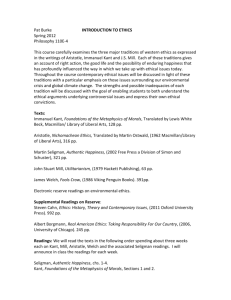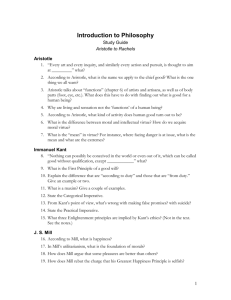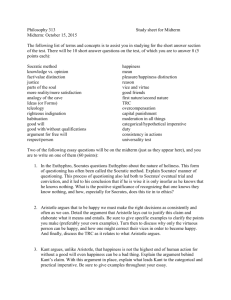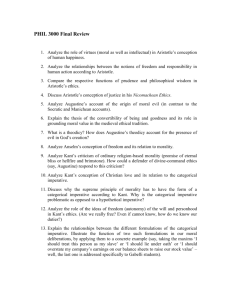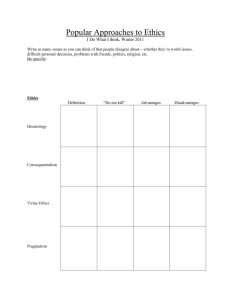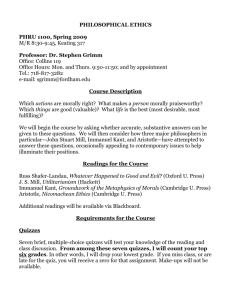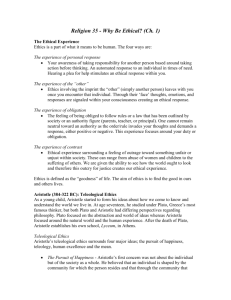Final Exam, Pt. 1 (Study Guide)
advertisement
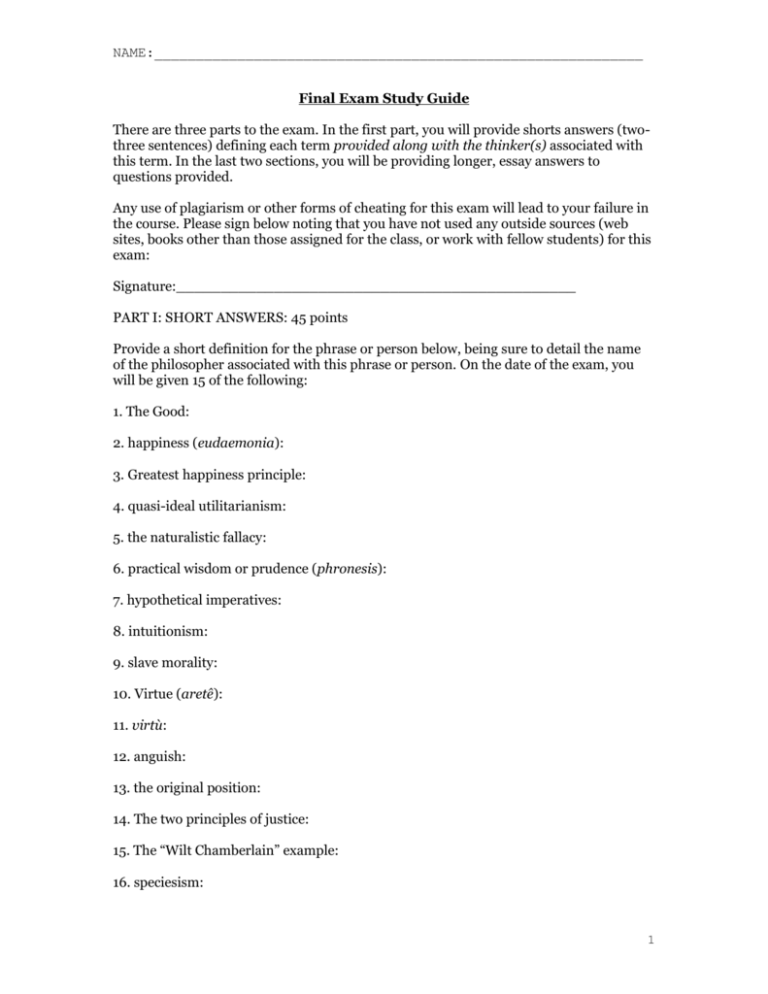
NAME:___________________________________________________________ Final Exam Study Guide There are three parts to the exam. In the first part, you will provide shorts answers (twothree sentences) defining each term provided along with the thinker(s) associated with this term. In the last two sections, you will be providing longer, essay answers to questions provided. Any use of plagiarism or other forms of cheating for this exam will lead to your failure in the course. Please sign below noting that you have not used any outside sources (web sites, books other than those assigned for the class, or work with fellow students) for this exam: Signature:_____________________________________________ PART I: SHORT ANSWERS: 45 points Provide a short definition for the phrase or person below, being sure to detail the name of the philosopher associated with this phrase or person. On the date of the exam, you will be given 15 of the following: 1. The Good: 2. happiness (eudaemonia): 3. Greatest happiness principle: 4. quasi-ideal utilitarianism: 5. the naturalistic fallacy: 6. practical wisdom or prudence (phronesis): 7. hypothetical imperatives: 8. intuitionism: 9. slave morality: 10. Virtue (aretê): 11. virtù: 12. anguish: 13. the original position: 14. The two principles of justice: 15. The “Wilt Chamberlain” example: 16. speciesism: 1 NAME:___________________________________________________________ 17. categorical imperative: 18. prescriptivism: 19. freedom: 20. sympathy: PART II: Answer two of the following essay questions. (Total value: 30%) (I will choose the two to be given on the actual exam.) Happiness and Ethics: In this essay, you will compare Aristotle and Mill on the notion of happiness. First begin by explaining what it means for Aristotle. How is it attained? Is it a state of mind, an action, a feeling? How is it connected to character, practical reason, and virtue? Be sure to define fully what Aristotle means by this term. Next, review what Mill means by happiness. Is it different from Aristotle’s meaning of the term? Why? What does it mean for Mill? Be sure to explain fully what Mill means by happiness, especially as it relates to his ethical theory. Lastly, what would Aristotle say about Mill’s definition of happiness? And why doesn’t Mill follow Aristotle’s definition? (That is, why, if he’s interested in happiness, too, doesn’t he simply say Aristotle was right?) Finally, would Bernard Williams side more with one thinker or the other? Why? Rawls and Kant on the Categorical Imperative In this essay, begin by discussing Kant’s categorical imperative. How do we figure out our duties towards others (and ourselves)? What kind of politics would this lead us to? Then examine one of the responses we have read this semester to Kant’s ethics in Rawls. Does this philosopher agree or disagree with Kant’s ethics? Why or why not? How do his principles align (or not) with what Kant dubs the “kingdom of ends”? In other words, is Rawls a Kantian? God and Ethics: It is normally thought in our society that one needs God in order to lead an ethical life. Nietzsche, however, argues that all such forms of thought are a “slave morality.” First, discuss what Nietzsche means by this and how it would differ from another author we have read this semester who cites the “Golden Rule” for the purposes of thinking morality. Next, is there a type of ethics or philosopher we read this semester whom you would deem a “slave morality”? If you wouldn’t, what do you find wrong with Nietzsche’s category. If so, why? PART III (25%) The Ought and the Is: In the first part of this essay, cite one of the philosophers we have read who has argued that we cannot derive an “ought” from an “is.” Firstly, what does this philosopher mean by saying this? (We have read several who have said this; you need only cite one for getting at the meaning of the phrase.) Next discuss Machiavelli’s reversal of this dictum, namely that one should never derive what is the case from what “ought to be.” What does 2 NAME:___________________________________________________________ Machiavelli mean by this? Why does he argue this point? Next, how would two of the philosophers we have read reply to Machiavelli? If we can’t link the “ought” and the “is,” what hope is there for the exercise of what we call ethics? This is the point you should drive home through the philosopher you are reading. What area of ethics do they favor (deontology, virtue, intuitionist, prescriptivist, etc.)? Take a side. Do you agree with Machiavelli? Which kind of ethics that we studied this semester do you find closer to your own views? Argue for your position not in some academic way, but as we are each doing: placed in messy and often violent world that Machievelli describes, we are aware that something other than what is the case perhaps ought to be different, and we may just guide our lives accordingly. Tell me why. 3

